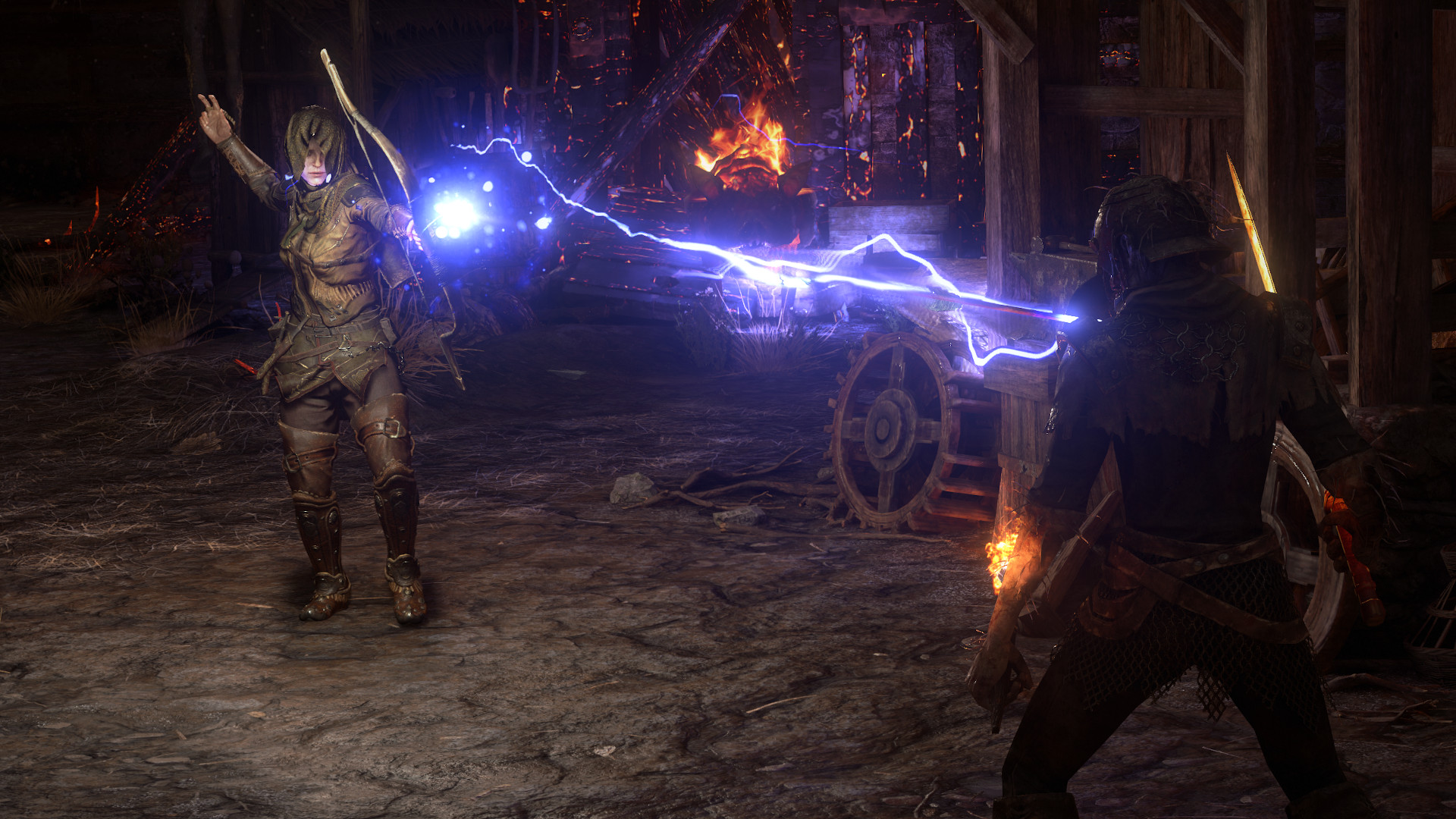
Path of Exile 2 now proudly stands on its own two gore-stained legs.
Not that it was a weak game when I played its first demo version at Exilecon in 2019—but five years ago it was just more (but prettier) Path of Exile, a game I like. A lot. At the time it was meant to be a massive expansion for the popular F2P action RPG, the two campaigns separate but dovetailing into a shared endgame. PoE2's scope and ambition have since completely outgrown that old design, and the end result plays very differently from its predecessor.
Now a fully standalone game and due for a (fully-featured, endgame and all) beta release later this year, I got to play the first four hours of it at a press event in LA, primarily as the projectile-centric ranger. The melee-heavy warrior and element-slinging sorceress were also available, three of a planned 12 base classes in the full game. Despite some technical issues, my first wish is that I could have played at least another four hours.
Kindred souls
This is pure gothic horror fantasy, wet, squelchy and rotten. From playing the first of six acts alone (the later ones seem to be even more fantastical), the variety of environments puts Diablo 4's samey overworld to shame. Dark woods filled with pouncing werewolves, ruins patrolled by cackling crones that summon demonic, dungaree-clad children to claw at you and pelt you with stones. Sunset-lit farmlands, burning villages and graveyards and mausoleums packed with skellingtons, undead knights and weirder, more corrupted courtly folks, bloated and blood-hungry. If you've played the first PoE, the tone is similarly bleak, even if the environments are far more detailed. Moment-to-moment, however, it's a whole new beast.
Over the past five years Path Of Exile 2 has metamorphosed into a much more Souls-like experience, despite still having strong Diablo roots and procedurally generated maps. It seems reductive to throw around other game names as comparisons, but chatting with both other press and even the developers led to the same end thought; this feels like it's cribbing notes from FromSoftware, in a very good (and challenging) way. Every enemy poses some threat, with most mid-scale monsters dishing out nasty, telegraphed hits. Dodge rolls are essential for avoiding the worst, and the frequent boss battles are multi-phase setpieces full of tricky projectile patterns and moves to dodge.
These are not fights you're expected to steamroll on your first encounter. Each boss arena has a handy checkpoint near it, allowing you to respawn at no penalty, with your potions restocked and ready for another round. And you'll be using them, because AoE blasts and targeted shots can wipe out 75% of your health (or more) in a single good hit. Death comes quickly, and healing takes time. One of the few concessions to players is a Sekiro/Armored Core-esque stagger gauge for bosses, buying you a couple seconds to get in some big free hits when it's filled.
Frequent as they come, from the eight or so bosses I saw in the first act (I reckon I had a few more to find), they're very varied, too, often preceded with visually distinct environments and unique enemy types. An early boss fight against a giant sandworm-like monster called The Devourer has it burrowing around the edge of the arena, parts of its body staying above ground to act as obstacles or even cover, its head shooting poison projectiles while its tail swats at you with melee attacks, forcing you to keep aware of everything happening in the arena at once.
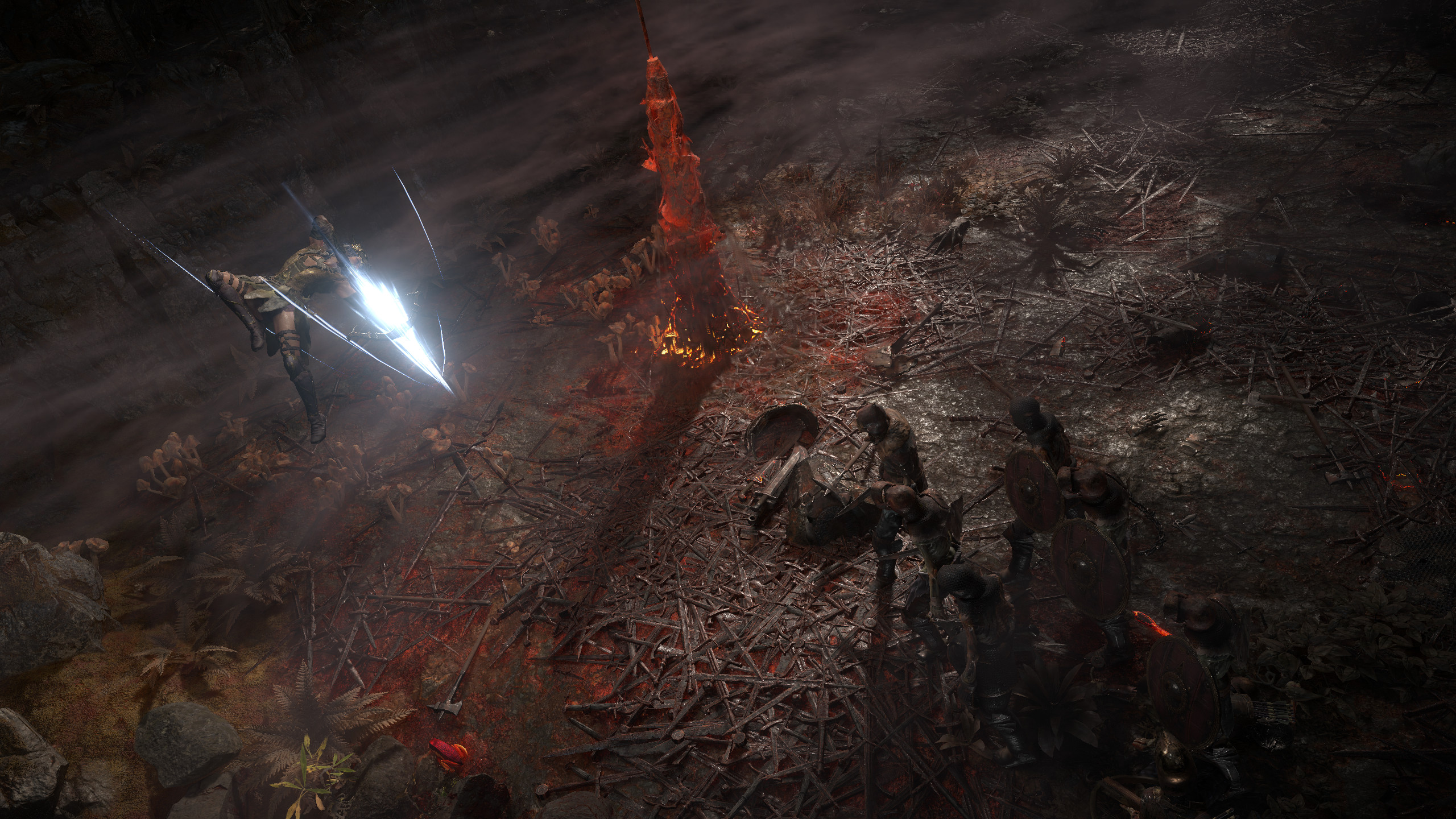
Reminiscent of both PoE1's Hailrake and the Capra Demon from Dark Souls, the Carrion Crone is an optional boss (and there are a LOT of optional fights speedrunners will be able to skip, at the cost of missing out on unique rewards) in the very first area. She forces panicked target prioritization as she pins you down with a mix of ice spikes erupting from the ground and sweeping projectile patterns plus gruesomely re-animating waves of dangerous and fast undead wolves that cannot be ignored safely.
This is what the game considers you ready for, fresh out of the tutorial. I was not. Still, I found it satisfying to club her into the snow with a freshly rolled warrior in my final minutes of the demo, learning (over several attempts) which attacks were best dodge rolled, and which I could safely block and counter.
These fights would be a lot harder to handle if PoE2 handled like your average click-to-move ARPG, but a recent shift in design has made that a secondary option. After trying both, I'm confident the majority of players will be using the gamepad-friendly new control system, moving your character freely with the keyboard (WASD by default) and targeting your attacks and blocks (if you have a shield) with the mouse. It's a notable shift to the 'action' end of the ARPG scale.
Roll-playing
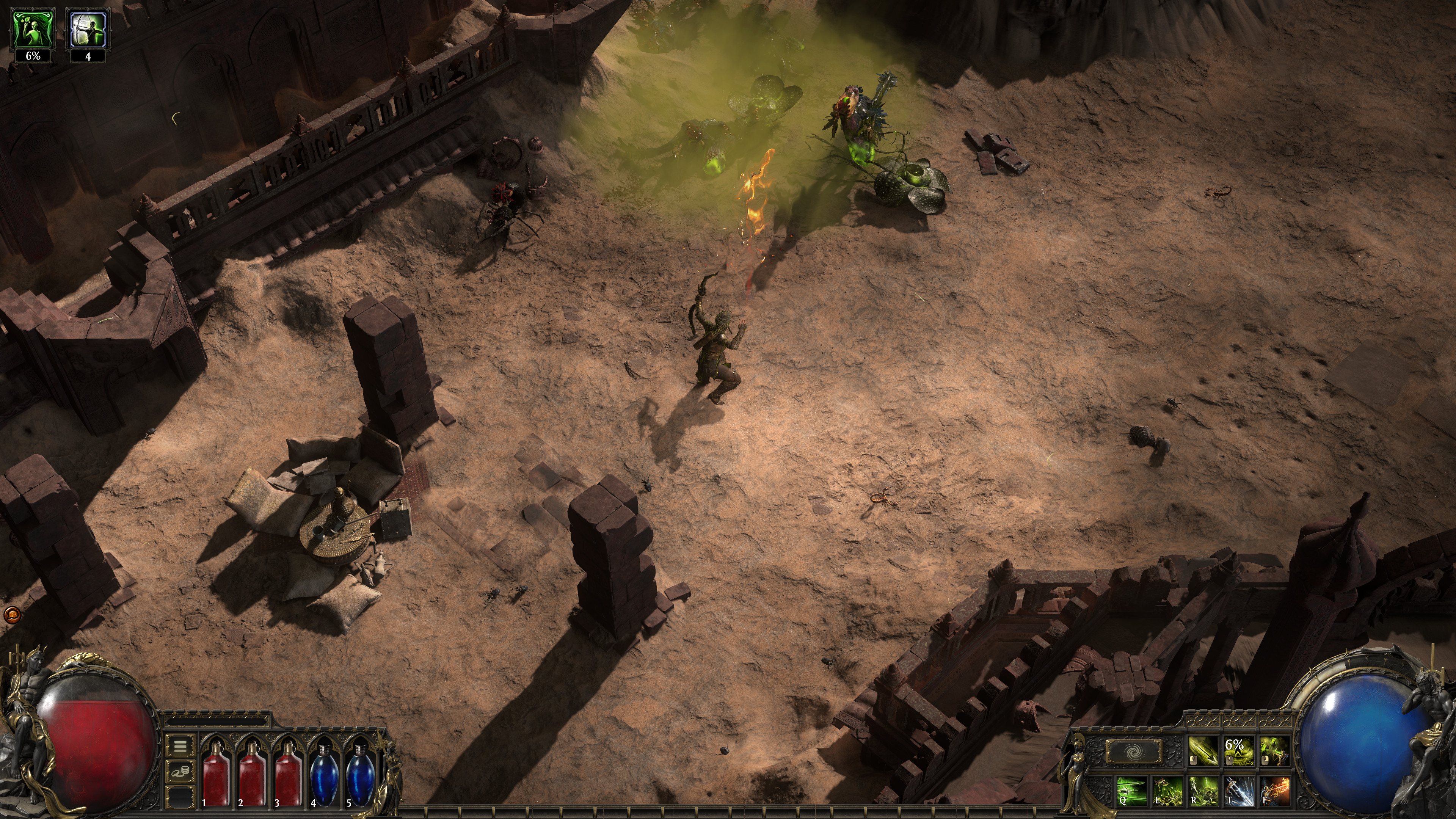
Almost all ranged attacks—including bigger spells—allow you free movement, albeit slower, letting you wiggle between bullet patterns, shmup-style, given time to react. While not available in the demo build, Grinding Gear also teased that the full game would have mount summon skills, which allow you to shoot from their backs at full speed and would act as combat-capable pets when dismounted. But even when moving around at full speed, combat is overall slower here than the original PoE. Or at least PoE as it stands now, with its speed and spamminess inflating over time. When I brought up that concern, game director Jonathan Rogers said they're trying to avoid that gradual increase for PoE2 and aim to keep the pace reined in, at least for the first few years after launch.
The slower pace means you can focus more on enemy attacks rather than getting drowned out in particle explosions, making animation canceling factor heavily into combat. Usually the domain of fighting games and character-action brawlers, both the dodge-roll and block moves come out instantly with no cooldown or resource cost to either, interrupting any high-commitment attack animations you might currently be in. The power to block projectiles also means that co-op play (for up to six) should be more interesting. Melee players can protect ranged ones directly and the reduced visual noise from the slower combat should make party play easier to parse.
All of this sounds very different from Path of Exile 1, and it is, but it also feels like a true successor to the first game
Blocking was obviously useful for evading damage (especially as a warrior, who has a lot of risky, slow wind-ups on his bigger hits), but I also realized it can be used aggressively. Yep, this one's got tech. Shenanigans, even.
Case in point: My ranger's Evasive Shot skill somersaults far away from where the mouse is aiming while firing an area-of-effect ice blast downwards. Interrupting this midair by rolling towards enemies allowed me to use it as an offensive technique. Same with when I picked up a shotgun-like heavy crossbow, which has slow, painful reloads between blasts. Dodge rolling immediately after each shot allowed me to maintain the same fire rate while remaining protected and mobile, letting me go toe-to-toe with some tricky enemies, including slow, shielded undead knights that would reflect my projectiles back unless I waited for them to swing at me first.
Another subtle but important tweak is how your potion flasks refill. In the original Path of Exile they were restocked just by killing any enemies, making bosses summoning in waves of fodder critters to deal with a quick and easy way to restock. Here, only tougher enemies will provide extra health and mana to chug on, turning swarms of minions into a resource-draining panic, especially as many of those minions can take a good chunk out of your health if you get complacent.
It's just one more layer of interesting but potentially stressful depth added to the combat.
Class act
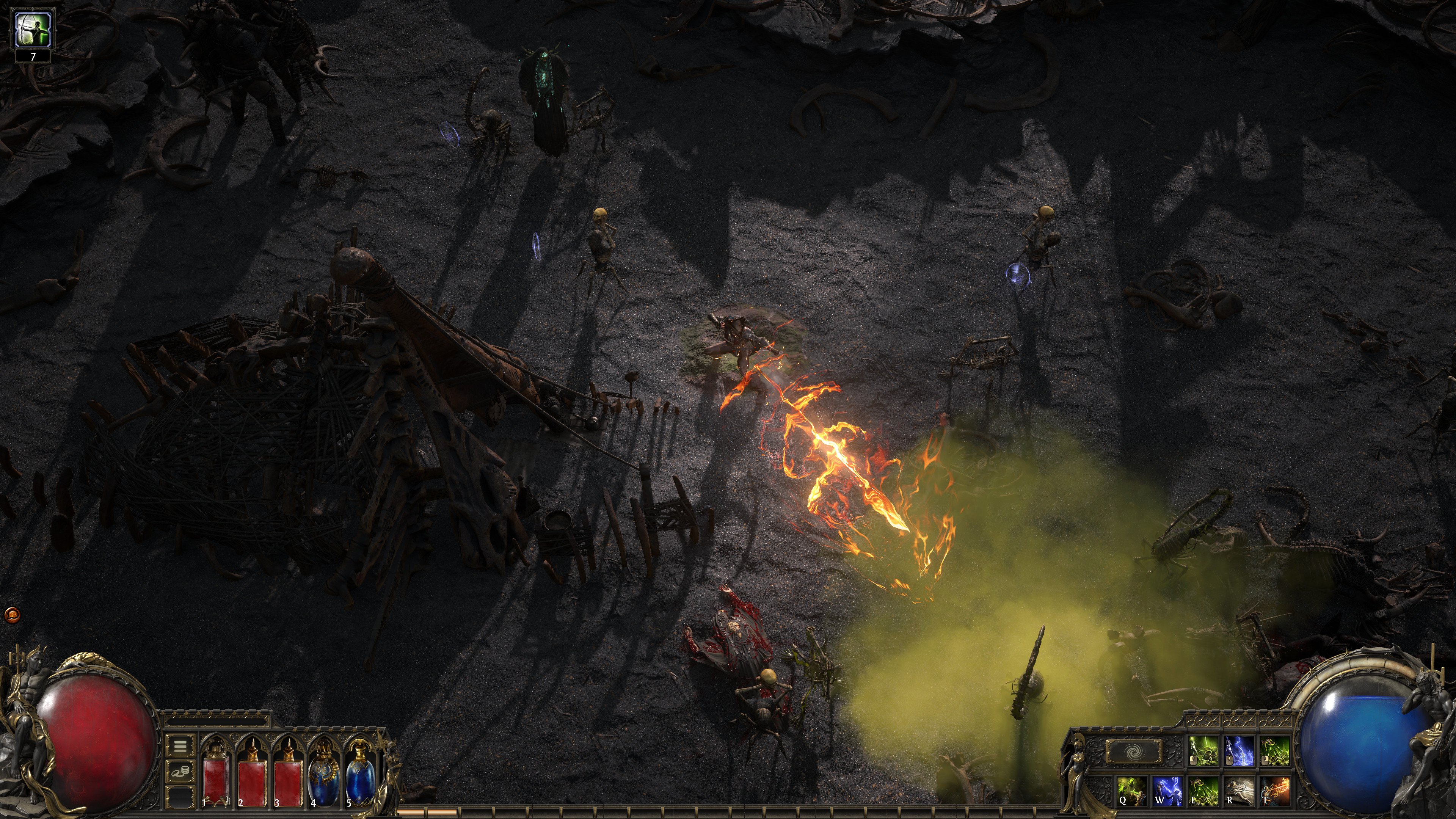
All of this sounds very different from Path of Exile 1, and it is, but it also feels like a true successor to the first game. The underlying stats and gear and progression systems represent clever evolutions. There are 12 classes to start as, each with a huge range of skills and spells to fill your eight hotkeyed ability slots with, coming in the form of equippable gems. Each skill gem is further customizable through looted support gems, letting you create some truly wild (if mana-guzzling) super-attacks. There's also skills with built-in synergies, like the ranger's (exceedingly handy) Vine Arrows spawning plants that grapple and poison enemies, but can also be fed additional poison to transfer that to enemies in the form of bonus damage.
I only got the slightest glimpses of what high level character building will look like. Fresh out of the tutorial area, the game rewards you with a new skill either from your chosen class, or any other, allowing you to start making freakish cross-class builds within five minutes of starting. Going hybrid feels very viable, too. You're free to equip two weapon loadouts, which the game automatically switches between if a skill calls for one or the other. During my brief time playing as the sorceress I equipped a one-handed wand and buckler in my secondary slots, letting me cast spells with my staff, but also instantly whip out the shield to deflect ranged attacks that I didn't want to waste time rolling out of. You'll have to sacrifice one of your skill slots to the block ability, but given how powerful blocking is here (negating damage so long as your own stagger gauge is unbroken), it seemed like a smart call, at least early on.
The mind-bendingly complex-looking passive skill grid also makes a return. An intimidating web of progression options allowing for long-term build wizardry and further cross-class antics, although it starts simply enough with a choice of 'more damage or more defense'. Fortunately PoE2 also seems more forgiving of character-building mistakes, allowing you to spend gold (yes, you can now buy items with simple currency instead of items) to partially or even fully respec your character, and as skill and support gems no longer slot into gear (they now exist on their own special loadout screen), it's easier to rework your attacks without forcing a total character rebuild.
While I greatly enjoyed my time with the game, I've got a few concerns still, but it's nothing that can't be hammered out by launch. The preview build was a bit crash-prone and the servers struggled and stuttered in places. The more mobile ranged combat can feel like it leaves melee classes on the back foot at present, as they rely much more on (satisfyingly Sous-like) high-commitment attacks—certain death, were it not for dodges and blocks canceling them out safely.
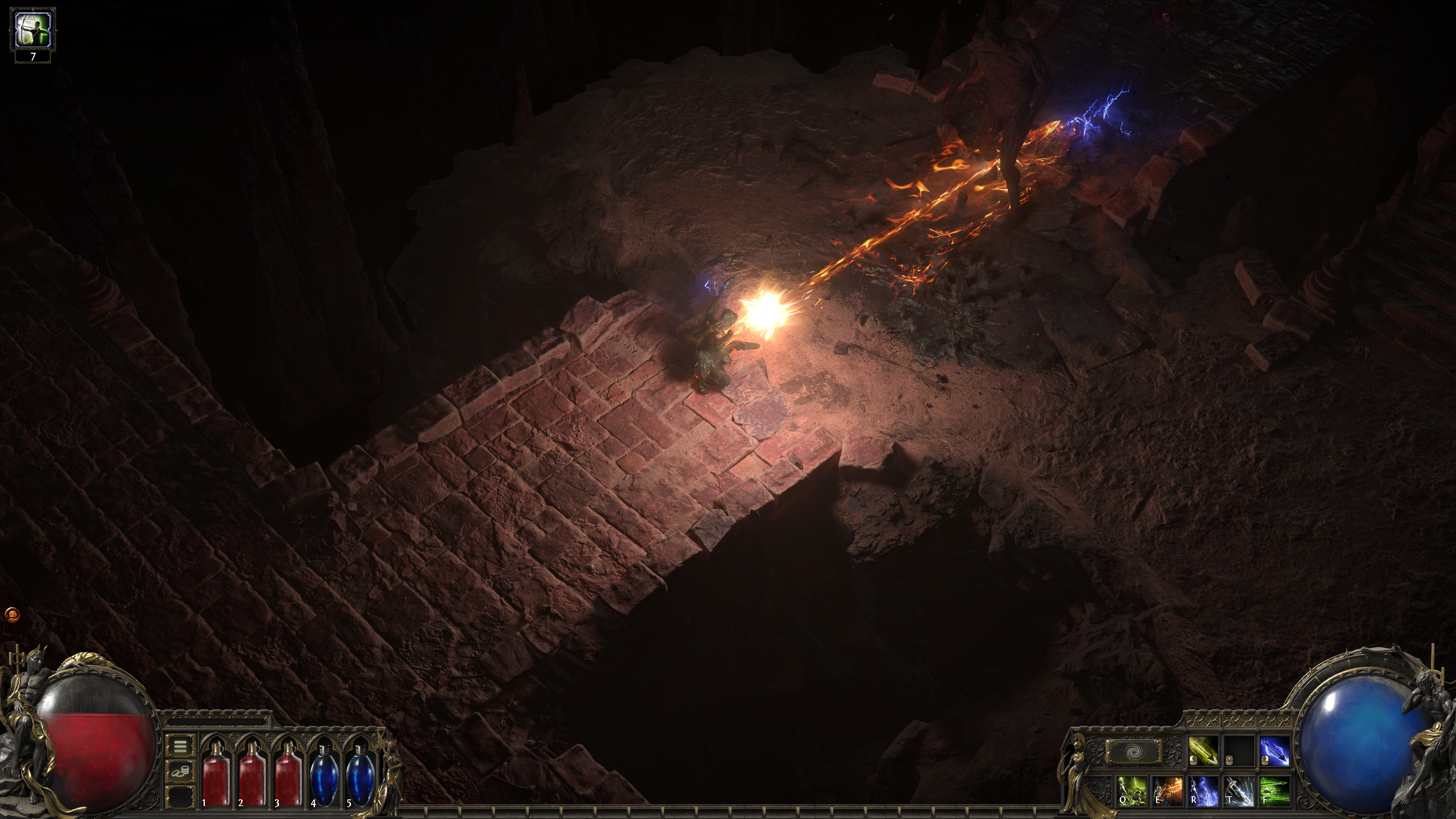
My loot drops during the preview event were also surprisingly stingy, reminding me of PoE1's resource-starving Hard mode, making the few good items I found feel special, but also makes it possible to just roll snake eyes on the drop tables and struggle in the DPS and armor race. It's something that will be less of a problem in the full game, with more time to pick over items, do side-quests and exploit the cross-character stash chest, but can make for a mean first impression.
One other minor concern I had is that the slower-refilling potions can leave you short of healing and mana in the middle of wandering the overworld, and the game's solution is a bit of a kludge; you can open a Town Portal at any time to hop back and restock for free, but it feels odd that you'd even have to. It feels like a crack in the game's design, a casualty of too many design reworks, with a cheap plaster filling to patch the gap. Hopefully it's not a sign of further strains.
The one outright bad bit of news I have regarding the game is that the release date has slipped back another few months, with the beta debut (which Grinding Gear say will effectively be the full game, endgame included, just needing the last few wrinkles ironed out) moving from June 7th to an indeterminate point "closer to the end of the year." But given how long the game has been in the works, and how much effort has clearly been poured into it, I think it'll be worth the wait.
Plus it's (mostly) free, some cosmetics and extended stash storage aside—neither essential to enjoyment. Considering the sheer volume of game Grinding Gear have promised here—a replayable, boss-packed six acts plus (if it's anything like PoE 1) a nigh-boundless recombinant endgame… Can't grumble about that.







